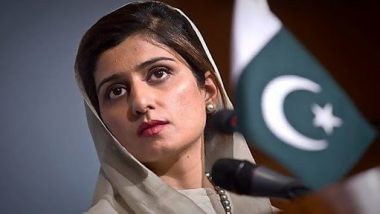Islamabad, May 1: The latest US intelligence documents revealed that Minister of State for Pakistan's Foreign Affairs Hina Rabbani Khar had cautioned the country against sacrificing its strategic partnership with China to maintain a cordial relationship with the United States, ARY News reported.
In March, Khar argued that her country can "no longer try to maintain a middle ground between China and the United States," the report revealed. The highly classified findings of the US intelligence revealed the internal assessment of Pakistan's policymakers on how to tackle the challenge of the growing tussle between the United States and China. Pakistan Minister Hina Rabbani Khar Reaches Paris To Attend FATF Meeting.
The US - in the leaked documents - had been able to gain access to the top-secret memo written by Khar. The leaked intelligence findings offer new insights into the challenges facing President Biden as he seeks global support for his efforts to reject the spread of authoritarianism, contain Russia's belligerence, and counter China's growing global reach. Hina Rabbani Khar Among Shehbaz Sharif's Council of Ministers in Pakistan; Check List of Ministers.
In an internal memo she titled "Pakistan's Difficult Choices," Khar cautioned that Islamabad should avoid giving the appearance of appeasing the West, and said the instinct to preserve Pakistan's partnership with the United States would ultimately sacrifice the full benefits of what she deemed the country's "real strategic" partnership with China, according to ARY News.
Meanwhile, another document, dated February 17, describes PM Shehbaz Sharif's deliberations with a subordinate about an upcoming UN vote on the Ukraine conflict, and what the government anticipated would be renewed Western pressure to back a resolution condemning Russia's invasion.
The aide advised the prime minister that support for the measure would signal a shift in Pakistan's position following its earlier abstention on a similar resolution, the intelligence document says.
The aide noted that Pakistan had the ability to negotiate trade and energy deals with Russia, and backing the Western-backed resolution could jeopardise those ties. When the UN General Assembly voted Feb 23, Pakistan was among 32 countries that abstained, according to ARY News.
(This is an unedited and auto-generated story from Syndicated News feed, LatestLY Staff may not have modified or edited the content body)













 Quickly
Quickly




















